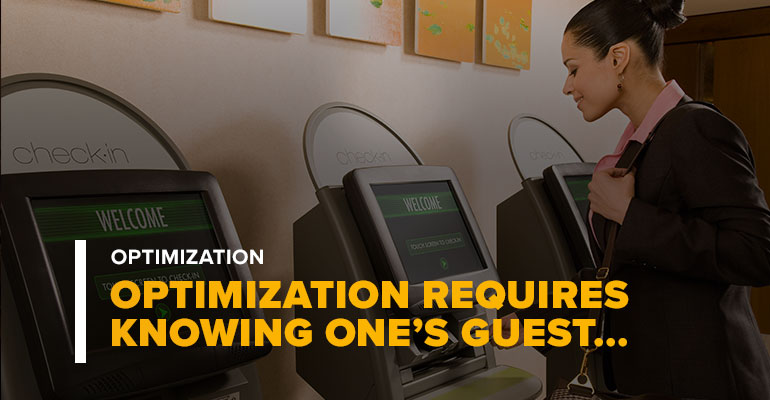August 25, 2019 - Published in Hotel Business Review - An optimized hotel operation consistently delivers against guest expectations. But in today's high-tech world, hotels have shifted more responsibility to the guest for his or her own experience. And a proliferation of brands-as many as 1,000 across the globe at current count-have blurred distinctions that once drove brand loyalty.
With fewer interpersonal interactions, how does a hotel operator stay abreast of guest expectations to impact satisfaction and, ultimately, inspire that guest to return and recommend-the ultimate goal of any service business?
Technology Drives the Guest Experience
Technology is driving changes in guest expectations today, and the fast pace of innovation makes it a challenge for operators to stay ahead of the curve. Travelers can book their hotel stay online then download an app that lets them bypass the front desk check-in process and access their room via their smartphone. They can place room service orders or request more towels from housekeeping via an in-room digital assistant like Alexa. and in some cases have those ordered delivered by a robot.
As guests continue to take on more responsibility for their own service delivery, they are increasingly happy to do so. The challenge for hoteliers is that all of these now-automated actions were once touchpoints in the guest experience. And those touchpoints have traditionally created opportunities for hotel staff to interact with guests, differentiate themselves from competitors, and influence guests' intent to return and recommend.
Add to that the proliferation of brands and a sameness of amenities at all but the highest-level hotels, at what point does the hotel product become commoditized? What replaces the traditional moments of truth that hotels once used to differentiate themselves from competitors? And how well can an operator know guests expectations and how well the hotel is meeting them when there are fewer opportunities to interact with them?
Sources of Guest Feedback
Technology may have eliminated many of the service touchpoints traditionally associated with hospitality but it is also part of the solution for operators striving to keep a finger on the pulse of changing expectations. Digital guest feedback surveys are an important tool for gauging satisfaction and identifying the specific areas operators should focus on to influence intent to return and recommend in real time. Operators can then integrate those key learnings into their workforce performance processes to optimize standards. forecasts and planning.
Too often, guest surveys are limited to a list of standard elements of a hotel stay against which guests rank their level of satisfaction. A more effective survey measures not only how satisfied a guest was but the expectations the guest brought to experience, what elements delivered on those expectations and what elements missed the mark. That kind of information can only be gleaned by including a few open-ended questions as prompts. These were traditionally a challenge to work with but technological solutions such as word frequency and sentiment analytics now make open-ended responses easy to analyze and understand.
Another survey best practice is to start from a brand positioning standpoint to gauge how well the guest's experience measures against his or her perceptions of the brand. For example, if a hotel brand markets itself as eco-friendly, how big a difference, if any, does that make in a guest's decision to stay there and ultimately to return and recommend? In a study UniFocus conducted for a hotel company considering such a move, we learned that an environmental focus was not among the top criteria influencing guests' choice.
A few more tips: Operators of multi-hotel brands should analyze survey results on both a property and brand level to maximize actionable insights and results. And all hoteliers should parse results to see if they are meeting the expectations of all guests or only those of their loyal customers.
In addition to guest surveys and other solicited responses, operators need to monitor the spontaneous comments guests post on social media and online review sites like TripAdvisor, Expedia and Yelp. Knowing what the hotel's guests are saying to others is crucial for operators to understand what is really driving individual intent to recommend.
Commoditization
Amenities that were once the hallmarks of a finer hotel are now standard at even three-star hotels, as guests have become accustomed to more creature comforts at home and expect the same when they're on the road. Premium bedding, fast WiFi and well-equipped fitness centers are the norm, not the exception. Quality of the hotel product, therefore, is no longer a differentiator for all but the highest-end brands.
Those are also the brands that continue to focus on interpersonal service as a key differentiator. So for the majority of brands that remain, what would be the moments of truth from a guest satisfaction standpoint that still hold true today? At what point is the hotel experience so commoditized that knowing one's guest no longer matters?
Brand Proliferation
The number of hotel brands has reached an unprecedented 1,000 across the globe today, as major hotel companies strive to capture an ever-bigger share of the market by introducing new brands targeting particular segments. This proliferation of brands is resulting in market saturation and growing brand confusion among travelers.
In recent years, Intercontinental Hotel Group has expanded to 10 brands, Hilton Hotels & Resorts to 16 and Marriott International to 30. How well can such a company know a guest's unique buying criteria-and is it even still important to do so-when one can offer that guest a choice of six different brands in the same market? Do Hilton Honors customers discern much difference between a Conrad, Signa or flagship Hilton? Or between Hilton Garden Inn and Tru by Hilton?
Likewise, does a Marriott Bonvoy member distinguish between Embassy Suites and Homewood Suites? And with so many similar brands in any given market, is a hotel or hotel company's relationship with a particular guest based on the ability to meet that guest's expectations or is it driven by what loyalty program he or she belongs to? Today's traveler might be hard-pressed to tell a substantial difference between two hotel chains' longer-stay products but might consistently choose one over the other to maximize points.
Whether it's Hilton Honors or Marriott Bonvoy, a loyalty program member has likely stayed at a variety of that chain's branded hotels at different pricing tiers. In certain markets however, a historically lower-tiered brand might book at a higher rate than a higher-tiered one. Is the customer so elastic to whatever brand is available that it doesn't matter? And are these brands still tailoring their products based on knowing their guest or is the strategy to give their guests such a wide range of products that they can be accommodated wherever they travel and whatever their needs?
Frequency of purchase is another factor influencing how guests relate to price levels across brands. A car buyer is most likely making that purchase no more than every three or four years and might well move up to a higher tier with each new car. For instance, that buyer might first become a Mercedes customer with the purchase of a C class and work up to an E class over time. A hotel guest, on the other hand, is making that buying decision far more frequently. There might be a $70 difference between two longer-stay brands by the same chain in the same market. Is there enough distinction between the amenities at those two hotels for a guest to pay the higher price?
There are exceptions-hospitality companies such as Loews Hotels, Omni Hotels & Resorts, Montage Hotels & Resorts and Four Seasons Hotels & Resorts-that have resisted stratifying and segmenting into multiple brands. Are these companies better equipped to know their guest because that guest is buying a consistent product with every stay? Four Seasons guests, for example, are known for reliably staying at a Four Seasons when they travel and might even choose a vacation destination based on the brand's presence there.
Ultimately, an oversupply of brands can make it a real challenge for hotel operators to gauge and respond to guest expectations and drive intent to return and recommend. In addition, the more brands a hotel company has the more overhead is required to maintain distinctions between those brands, which makes optimization more challenging.
Striking the right balance between providing guests with self-service conveniences they have come to expect, and human interaction with staff, opportunities for "moments of truth" that differentiate the brand and can forge, reinforce or strengthen the bond with guests, is the answer. How effectively do you think you are navigating that fine line? If you're interested in a conversation, please let me know. I'd like to know your thoughts.






